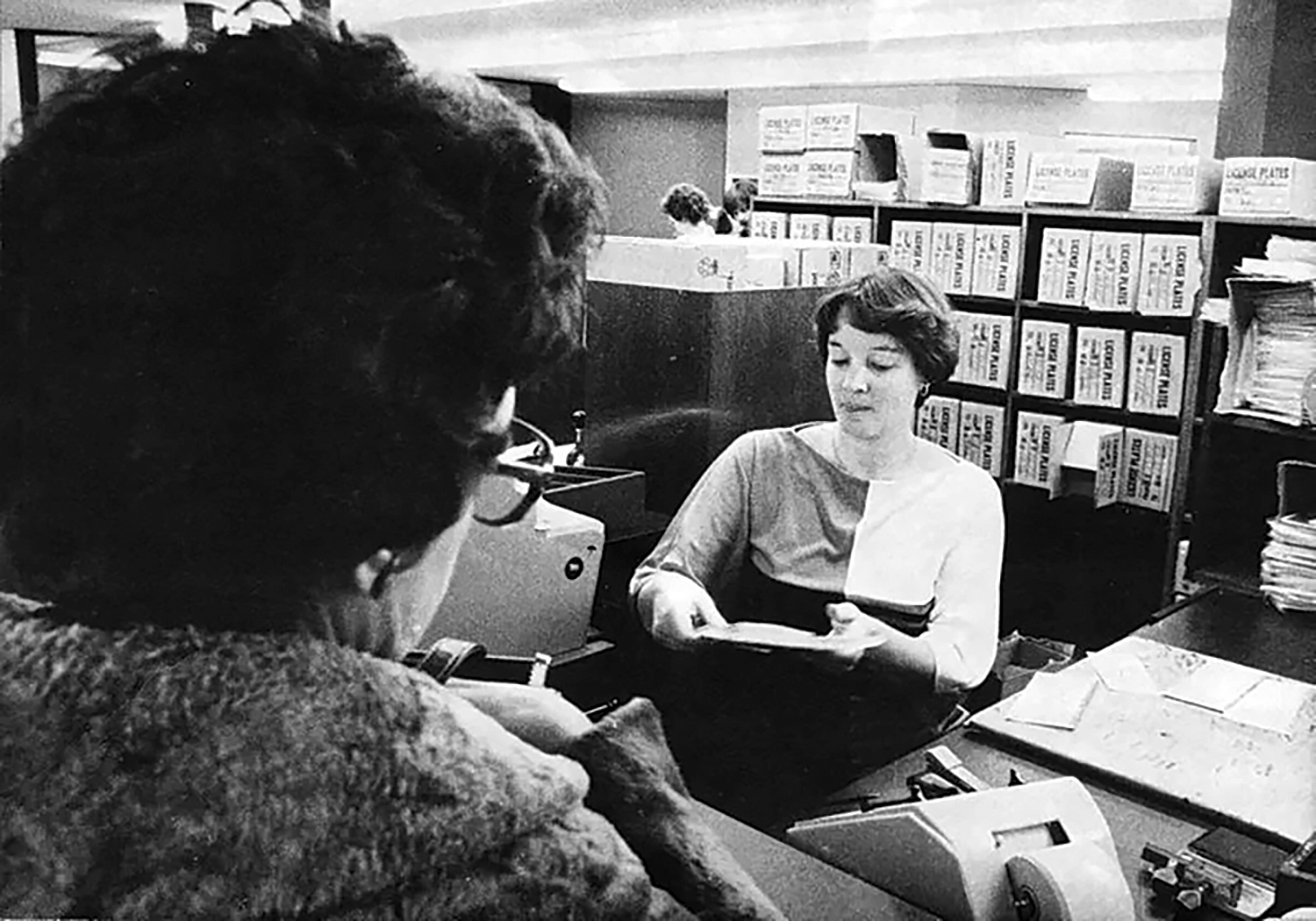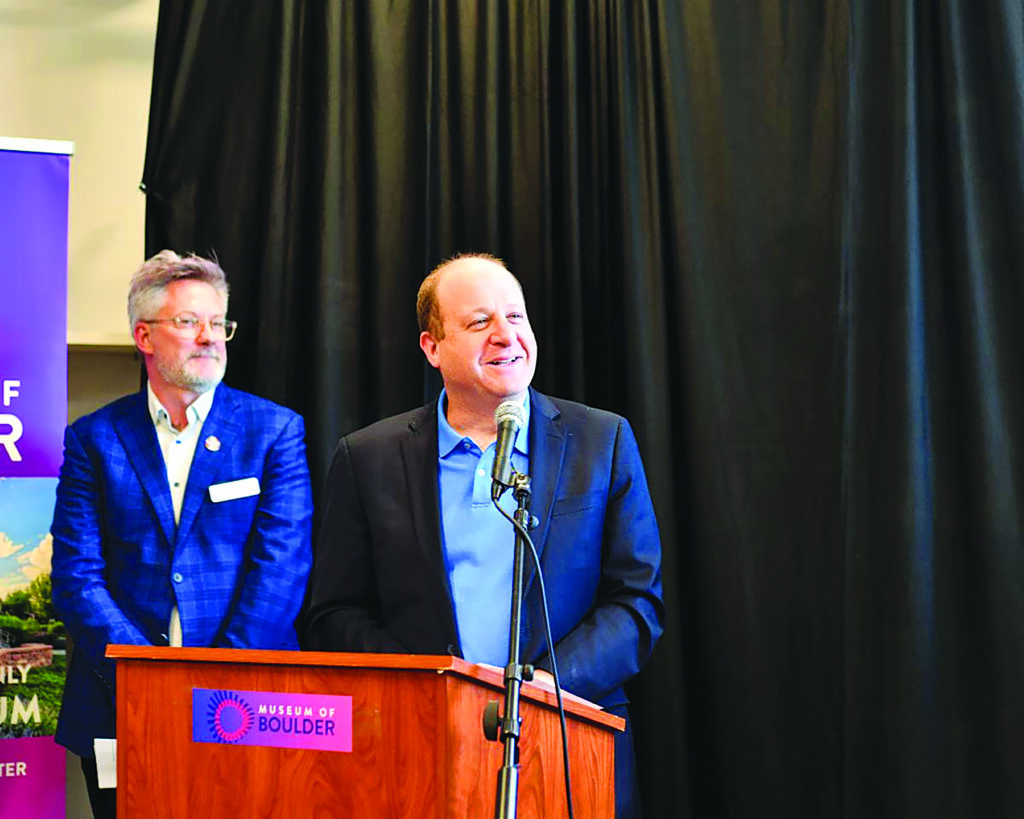
Half a century ago, a quiet but revolutionary act unfolded in the Boulder County Courthouse. With little fanfare, county clerk Clela Rorex became the first public official in the country to issue a same-sex marriage license on March 26, 1975. It was a decision based on principle rather than politics, but it sparked a firestorm of controversy and broader discussion about LGBTQ+ rights.
“Resurrecting the stories of ordinary people who shaped history is transformative,” says Emily Zinn, director of education at the Museum of Boulder and lead curator of its newly opened exhibit, Bending the Arc: A Uniquely Boulder Story of LGBTQ+ Rights. “It means a lot to those who lived it, and helps young people see what’s possible.”
On March 14, nearly 50 years after that historic day, guests climbed the museum’s newly painted rainbow staircase to celebrate the opening of Bending the Arc. Speaking to a crowd of more than 100 people gathered in the lobby of the Tebo Center on North Broadway, Museum of Boulder executive director Chris Taylor shared how he heard about Clela Rorex three times in one day while interviewing for the position.
The story, he said, is “more complex than two men walking into a courthouse.”
Bending the Arc peels back those historical layers. The exhibit examines the city’s legacy of LGBTQ+ advocacy, including the leadership of Mayor Penfield Tate II, city council member Tim Fuller and Rorex herself.
“History isn’t just made in Washington, D.C. or national headlines — it’s made in cities like Boulder by everyday people with the courage to stand up when it matters most,” said Mardi Moore, CEO of Rocky Mountain Equality, an exhibit partner. “We owe it to [Fuller, Rorex and Tate] and ourselves to keep bending the arc toward justice.”

Curating change
Piecing together the history of Bending the Arc brought together decades of archival materials, personal narratives and community contributions. The exhibit centers on a vast collection of documents, including letters sent to Rorex — some supportive, others condemning — offering visitors a raw glimpse of public sentiment in 1975.
Rorex isn’t the only advocate receiving their due recognition in the exhibit. Tate, Boulder’s first and only Black mayor, defeated a recall campaign but lost re-election in 1975 largely due to his progressive policies, including his support for a contentious amendment to the city’s Human Rights Ordinance that protected people against discrimination on the basis of sexual orientation. Fuller, a gay man who was closeted during his time on council, was successfully recalled for his role in amending the ordinance.
“This exhibit began with commemorating the 50th anniversary of [the first same-sex] marriage licenses,” Zinn says. “But after talking to community members, namely historian Glenda Russell, we realized we needed to take a broader view.”
As a queer person, Russell wanted to see more than allies represented. In addition to the letters from the museum archive and items from the Tate family, there are campaign buttons, T-shirts and photographs related to activism by LGBTQ+ members of the community from Russell’s collection.
For Zinn, who began working on Bending the Arc shortly after Taylor took the helm last June, the endeavor is more than just an academic pursuit — it’s a continuation of her family’s commitment to activism. Born and raised in Boulder, Zinn’s mother, Sonny, was an educator and social justice advocate who participated in demonstrations supporting civil rights efforts.
“My parents were very political,” Sonny recalls. “I grew up at some of the demonstrations you see photos of in the exhibit. I was raised to respect everyone and assumed it was like that everywhere. All my friends and their families were advocates, so when people pushed back, we were surprised. Why would anybody push back?”
Walking through the exhibit for the first time, Sonny was struck by the intensity of emotions it evoked. Seeing the language used in some letters opposing same-sex marriage served as a stark reminder of the animosity some people have towards queer people.
“It’s shocking to see how hateful our nation can be,” she says. “Even in a place like Boulder.”
That experience brought back conversations she had with her daughter throughout her childhood — discussions about equality, justice and the responsibility to remember. Seeing how the show affected her mother strengthened the younger Zinn’s belief in the power of stories to move the needle on progress.
“With any history that’s not major mainstream history, it lives on through conversations and memories in the community,” Zinn says. “The opportunity to bring the community together and celebrate the actions of everyday people is the reason to do all this.”
The legacy continues
As the opening night unfolded, the significance of the moment was not lost on the speakers. Colorado Gov. Jared Polis, the nation’s first openly gay governor, pointed to the enduring impact of the actions of social justice advocates in Boulder.
“When Clela Rorex first issued those marriage licenses, she showed us what was possible,” Polis said. “The inclusive view of Boulder is an important part of Boulder’s future as well … with the challenges we face dealing with our own federal government on many of these issues, local and state advocacy is more important than ever before.”
Boulder Mayor Aaron Brockett echoed this sentiment, noting that he has trans children and is aware of the ongoing challenges.
“The title of this exhibit reminds us that the arc of the moral universe is long, but it bends toward justice,” Brockett said, quoting Martin Luther King, Jr. “The problem is that bend is not a straightforward one. It goes back and forth sometimes, and the exhibit calls that out.”
Beyond Boulder, Bending the Arc serves as a significant touchstone in the national fight for LGBTQ+ rights. The exhibit’s opening coincides with ongoing efforts at the state level to expand queer historical recognition, including the Boulder County Courthouse, which was recently added to the National Register of Historic Places for its role in this landmark moment.
As Bending the Arc stands on display, its presence is a stark reminder of how far Boulder has come and how far there is still to go. As visitors descend rainbow steps, the hope is that they carry this history forward.
“As you experience this powerful exhibit, ask yourself: Where can I be bold?” Moore said. “Because the actions we take today shape the history of tomorrow.”
ON VIEW: Bending the Arc: A Uniquely Boulder Story of LGBTQ+ Rights. March 14 through Sept. 29, Museum of Boulder at Tebo Center, 2205 Broadway, Boulder. Free to $10
